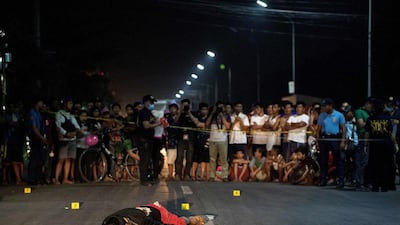MANILA // Unknown assassins have killed scores of poor victims in the Philippines since president Rodrigo Duterte ordered police last month to withdraw from his deadly drug war, according to a human rights monitor.
The mystery assailants are killing between nine and 10 people daily, said Amnesty International’s Philippine branch. This is fewer than the 30 or so a day being killed by police and others when officers were still leading the crackdown, but the targets are the same.
“The targets are still the same, as far as we are concerned: people linked to drugs and who live in poor neighbourhoods,” campaign official Wilnor Papa said.
Mr Duterte pulled police from the crackdown on January 31 after a seven-month campaign in which 2,555 drug suspects were killed by law enforcers, with 3,930 other people murdered in unexplained circumstances.
The latest tally from showed there were 4,076 “murder cases under investigation” on February 13.
This was 146 more than the end of January, which human rights groups said showed extrajudicial killings had decreased but were nevertheless continuing in the drug war.
Police found four men shot dead inside a shanty in northern Manila before dawn on Thursday, in a scene very similar to those covered at the height of the drug war.
Witnesses said unknown suspects broke into the house and started shooting, while three other men were shot dead in separate incidents elsewhere in the same district that night, local police said.
Mr Duterte ordered police operations in the drug war to cease so he could tackle the widespread corruption in the force. .
This came after anti-drug officers kidnapped a South Korean businessman then murdered him inside the national police headquarters as part of an extortion racket, according to an official investigation.
But Mr Duterte promised the war would continue and more addicts, as well as traffickers, would be killed as he sought to eradicate drugs in society.
Amnesty issued a report earlier this month accusing police of systemic human-rights abuses in the drug war, including shooting dead defenceless people, paying assassins to murder addicts and stealing from those they killed.
It also said police were being paid by their superiors to kill.
Mr Duterte has since ordered the much smaller drug enforcement agency to lead the drug crackdown, with the support of the military.
Derrick Carreon, spokesman for the 1,791-member drug agency, said there had been far fewer killings by authorities since it took charge, without giving figures.
“(But) there is no point in comparing these figures because the police is a much larger organisation, capable of conducting more operations,” Mr Carreon said, adding the military had mostly acted as observers so far.
The national police force has 160,000 officers.
Agence France-Presse

